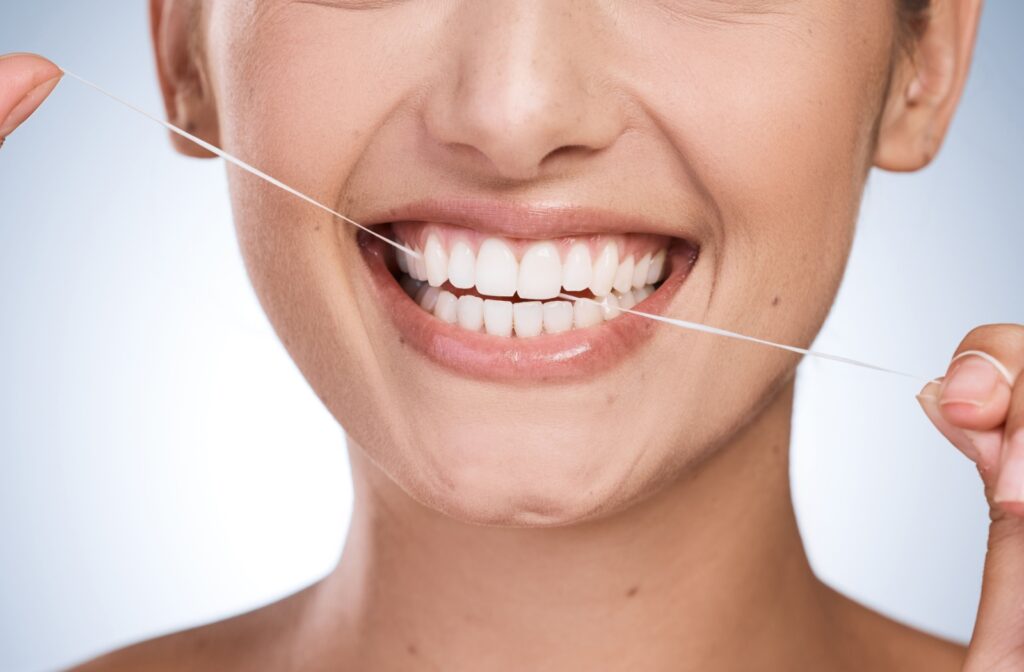Flossing often feels like an extra step in oral care, but it is a vital part of a healthy routine to keep your teeth and gums healthy.
Regular brushing and flossing help prevent serious dental problems. While brushing cleans the more visible surfaces of your teeth, flossing reaches areas that a toothbrush cannot, like between teeth and below the gum line. Neglecting regular flossing can lead to plaque buildup, gum disease, and even tooth loss over time.
Why Is Flossing Important?
Flossing is a critical step to remove food particles trapped between teeth and under the gumline to prevent plaque and tartar buildup.
Plaque is a sticky substance that forms continuously throughout the day. Plaque has bacteria that can create acids and damage the teeth and gums over time. This can lead to more serious dental issues, like:
- Bad breath
- Gum disease
- Cavities
If it’s not removed with regular brushing and flossing, plaque can harden into tartar. Unlike plaque, tartar can only be safely removed by a dentist or hygienist during a cleaning appointment.
What Happens if You Don’t Floss?

Cavities
Plaque and tartar cause bacteria to cling to your teeth, producing acids that can wear your enamel down and lead to cavities.
These cavities often go unnoticed until they require significant treatment, such as fillings or even root canals. Good oral hygiene can prevent tooth decay, which prevents more extensive measures down the line.
Bleeding Gums
Many people hesitate to floss because they think it may hurt their teeth and gums. People who start flossing sometimes find that it causes their gums to bleed. However, healthy gums don’t bleed.
The accumulated plaque around your gumline can cause inflammation and make your gums more prone to bleeding. When you remove plaque buildup, you may temporarily cause your gums to bleed, but this is a sign that you should be flossing more often.
Flossing promotes healthier gums and overall oral health, preventing more serious complications like gum disease.
Periodontitis
While earlier stages of gum disease can be reversed with good oral hygiene, severe cases can cause permanent damage to the tissues and bones that support your teeth.
As plaque and tartar continue to build, gingivitis can progress to periodontitis, a more severe form of gum disease.
Common symptoms of periodontitis include:
- Red, tender, or swollen gums
- Loose teeth
- Bad taste in the mouth
- Gum recession
Health Issues
Neglecting flossing may also impact overall health. Studies have shown a connection between gum disease and systemic conditions such as heart disease, diabetes, and respiratory issues.
Oral bacteria can enter the bloodstream through inflamed gums, potentially contributing to these conditions. This highlights the importance of regular flossing as part of not just oral health but overall well-being.
How to Make Flossing Part of Your Routine
Incorporating flossing into your daily routine can feel daunting at first, but consistency is key.
Floss once a day, ideally before bedtime:
- Use about 18 inches of floss, wrapping it around your fingers with a short segment left for cleaning
- Slide the floss gently between teeth and curve it around each tooth, moving it up and down to clean the gumline
- Brush your teeth after you floss, which is more effective in combating gum disease and tooth decay
If traditional floss is challenging, consider alternatives like floss picks, interdental brushes, or water flossers. These tools can make flossing more accessible and comfortable while providing the same benefits.
You can also try pairing flossing with another daily habit, like your skincare routine, to make it a seamless part of your day.
Keep flossing supplies easily accessible to avoid forgetting. Storing floss in the same place as your toothbrush can help remind you to use it. Additionally, setting a timer or using a dental hygiene app can help track your progress and make flossing a consistent habit.
Maintaining Oral Health with Regular Dental Visits
While flossing is essential, visiting your dentist regularly is equally important for maintaining good oral health. Professional cleanings remove tartar and plaque that at-home care can’t. Additionally, routine checkups help identify issues like cavities or gum disease early, when they are easier to treat.
At Sundance Dental Clinic, we’re dedicated to helping you achieve optimal oral health through preventive care and personalized advice. Whether you have questions about proper flossing techniques or need a routine cleaning, our compassionate team is here to assist you.
Contact our team today to schedule your next appointment. Let us help you protect your smile and maintain a healthy mouth for years to come.




